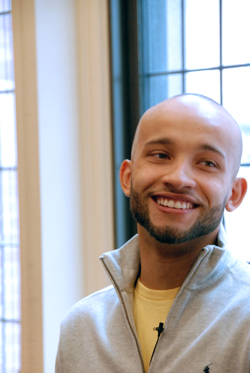Christopher Infantry: Channeling Mrs. O'Connell
Christopher Infantry: Channeling Mrs. O'Connell
Christopher Infantry’s journey to TC is ultimately a testimonial to the power of an excellent teacher.
Infantry grew up in Central Etobicoke, a working-class neighborhood of Toronto, the child of a Polish mother, a receptionist, and a Jamaican father, a car salesman. His seventh grade teacher in public school, Mrs. O’Connell, was a small Irish woman who put up with a lot of classroom antics from Infantry and his friends -- bright kids, but cut-ups in class.
One day, Mrs. O’Connell called a parent-teacher conference that would change Infantry’s life. She told his mother that he was intelligent and capable enough to do anything he wanted, including becoming Prime Minister some day.
“What it really said to me,” Infantry recalled recently, “was, if you’re saying I can be the leader of the country—and you’re not even my mom, you’re just my teacher—if you have that belief in me, why don’t I have that same belief in myself?” Infantry began to examine what he was doing in school, and why he wasn’t giving it the best he had. He began to focus on his studies. His marks went up. He moved on to an International Baccalaureate high school, Weston Collegiate Institute, and rose to its demands. His success there enabled him to attend Carleton University in Ottawa, where he earned a bachelor’s degree in Public Affairs and Policy Management.
There were other “aha” moments, like whenInfantry came back to Toronto on college breaks and saw his buddies from middle school. They were as capable or more so than he, but they were not attending college, and some were not working. Some were in jail. “Now their direction in life was totally different,” Infantry says. “I’ve seen so many bright minds go to waste.” Thinking back to Mrs. O’Connell, Infantry resolved not only to finish his education, but return to a school setting as a teacher.
“I’m at Teachers College because of injustice,” he says. He is passionate about correcting what he sees as massive inequality in education—not just the disparities in access to excellent teachers, curricula, resources and support services, but also the premise upon which most schools are built. “I’m always curious as to why we’re making students try to change to fit the system, and not making the system to fit the student,” Infantry says.
He ticks off alarming dropout rates among minority students in Toronto and their causes. In poorer schools, curricula are not engaging, teachers may be less skilled or experienced, and classes are too big. Behavioral policies are simply misguided. (What is the sense in suspending a misbehaving student? Infantry asks. He needs more time in school, not less.) And in most poor areas, some kids come to school every morning ill-prepared to learn. “It’s hard to read Shakespeare when your belly’s hungry,” he says.
Long term, Infantry hopes to eventually do work in education policy. He is particularly engaged in his classes with TC professors Doug Ready, Aaron Pallas and Amy Stuart Wells, who are “great at taking the content and making it learnable, manageable,” he says. From them he is learning research techniques for exploring abstract questions in education—for example, what are the qualities that make a good teacher? -- and quantifying the answers so that people making funding decisions will listen.
Before he enters the policy world, however, Infantry wants to teach for a while, either in New York City or in Toronto. Children and young adults—particularly those from minority backgrounds—need positive male role models, he says, to help them believe that they, too, can someday go to college and graduate school. Infantry wants to be some other child’s Mrs. O’Connell.
Published Wednesday, Oct. 12, 2011
